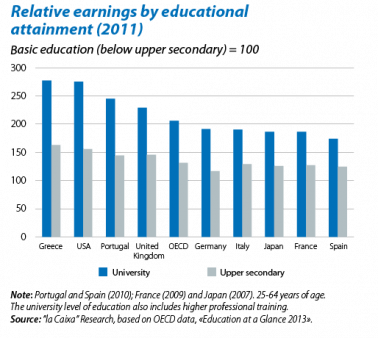The return on education in Spain
In a market-oriented economy that is working properly, there is a very close relationship between a worker's earnings and their educational attainment. Those attaining a higher level of education are normally more productive and therefore receive a higher wage. In Spain, in 2010 those workers who had completed, at most, lower secondary education received an average annual gross salary of 16,757 euros, while the earnings of an individual with a university education reached 29,548 euros. Education and training therefore tends to have its rewards.
The earnings premium in Spain, however, is lower than that of the main OECD countries. On average, in OECD countries the earnings of a worker with university studies is double that of a worker with basic studies, while in Spain it is just 75% higher. There are many factors influencing the size of the earnings premium but relative supply and demand for each educational attainment segment are key.1
In this respect, Spain's supply of people with a university education seems very similar to that of other OECD countries. In 2000 the share of Spain's population aged between 25 and 64 with a university qualification was 23%, 1 percentage point above the OECD average. In 2011 this ratio was 32%, both in Spain and the OECD average. Consequently, when the supply is equal, if in Spain the earnings premium for universities is lower, part of this is likely to be due to a lower demand for this kind of worker. Another element that helps to explain this phenomenon is the fact that the effective educational level of Spain's universities is lower, as shown by the OECD's survey of adult skills in 2013.2
Also of note is the different trend in the earnings premium over the last decade in OECD countries and in Spain. There has been a considerable increase for workers with university qualifications in both cases but this has been more pronounced in the OECD countries than in Spain. Specifically, in Spain the rise is 10 p.p. while in the OECD countries on average it is 23 p.p. The trend in the earnings premium has been the opposite for workers studying until upper secondary education: this has risen in the OECD countries but fallen in Spain. In this case, however, the supply trends have been very different; in Spain the supply has increased considerably while it has remained the same in the OECD. To ensure the rewards from education are not paltry, we should try to resemble more the outstanding OECD students.
1. Other important factors are the minimum wage regulations and institutions governing labour relations.
2. See «OECD Skills Outlook 2013. First Results from the Survey of Adult Skills».


